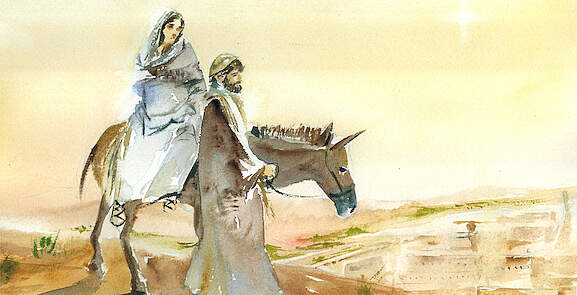
"When Joseph awoke, he did as the angel had commanded him and took Mary home as his wife" (Mt 1:24). This verse from the Gospel says a lot about the harmony that existed between Joseph and Mary. The Fiat of Mary and the Fiat of Joseph are the fulfillment of the original harmony between Adam and Eve, the perfect reenactment of the Covenant of Mount Sinai.
The Covenant of Mount Sinai was addressed to both men and women, a fact which Jewish tradition emphasizes: "The Father of the universe proclaimed the ten words and oracles ... when the nation, men and women together, had come together in assembly." (1)
At the beginning of the New Covenant, a man and a woman are called by God, and we see a proclamation made to Mary (Lk 1:26-38) and another to Joseph (Mt 1:18-25). After the dialogue with the angel, Mary gives her assent. Joseph first thinks of parting ways with Mary until an angel reveals to him his own mission.
Saint John Paul II wrote this about Mary, on August 15, 1988: "At the beginning of the New Covenant, which is to be eternal and irrevocable, there is a woman: the Virgin of Nazareth."
And he wrote this about Joseph, on August 15, 1989: "This just man (Joseph), who bore within himself the entire heritage of the Old Covenant, was also brought into the ‘beginning’ of the New and Eternal Covenant in Jesus Christ."
Thanks to the "yes" of a woman (Mary) and the "yes" of a man (Joseph), God established the New Covenant: the Son of the Most High, the Divine Word who put on our flesh to become, in the most sublime way, the Emmanuel-God with us, and was known as the Son of Mary (Mk 6:3) and the Son of Joseph (Jn 1:45).
The Covenant made on Mount Sinai represented the birth of Israel as the people of God. It was a repeat of the genesis of the human race, at the beginning of the world. At Sinai God created Israel to establish a covenant of love. In Eden, God created humanity (represented by Adam and Eve) for a covenant of friendship. But just as the people sinned by making a golden calf after the Sinai Covenant, so Adam and Eve disobeyed God and their previously harmonious relationship with Him broke apart (Gen 3).
Joseph and Mary were faithful to the Covenant—Joseph was a just man (Mt 1:19) and Mary was the humble handmaid of the Lord (Lk 1:48)—and they fulfilled the law of the Lord (Lk 2:23). Because of their union with God, Joseph and Mary truly lived as one person (Gen 2:24).
(1) Philo of Alexandria, De decalogo, 32
The Marie de Nazareth editorial team